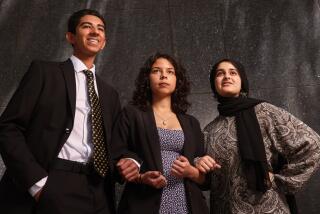Fighting Big Tobacco One Teen at a Time
- Share via
My friends and I, say about 8th grade, started talking about someday becoming doctors, lawyers, and yes, even journalists. I cannot recall any of us ever saying, When I grow up, I want to take on the tobacco companies.
When Marilyn Cowan Pritchard was that age, she certainly never dreamed of such a career.
“When I was in 8th grade, I was a smoker,” she said. “I was a typical rebellious teenager.”
But since 1990, Pritchard has been deeply immersed in the tobacco wars. She is coordinator of the county’s Tobacco Use Prevention Program. The tobacco companies may not be happy about it, but they indirectly support her salary. The prevention program is paid for solely through a special 25-cents-per-pack tax California voters agreed to via Proposition 99 in 1989.
I went to see Pritchard in part because I was upset with what’s going on in Washington. A handful of powerful Republican senators have thwarted a major tobacco bill--one supported by the majority, which also includes many from their own party.
I don’t know all the details of the bill, but if the tobacco companies are against it, I figure there must be some good in it for you and me. So I wanted to hear from someone who is used to rubbing the tobacco companies the wrong way.
And don’t think the Marlboro Man and his friends won’t bother with people at Pritchard’s level. Front organizations for the tobacco companies already have gained access to the entire files of other county coordinators in the state who have roles similar to Pritchard’s, she said. They use the federal public records act to see what their adversaries are up to. She’s nervously waiting to see if it happens here.
What they would find is that Pritchard and her volunteer advisors discovered well ahead of Clinton/Gore the key to tobacco use prevention: targeting teens.
“When we first began, we took a typical public health approach: We went after the smokers,” she said. “But as our program has evolved, we’ve changed. Now we address our efforts toward the youth.”
And with good reason. Health statistics show that 90% of those who smoke begin as teenagers. Only 20% start after they are 18, and only 10% take up the habit after their teen years.
So the Tobacco Use Prevention Program came up with some ingenious ways to reduce teen access to cigarettes. Pritchard and her staff send local youths to liquor stores, service stations and convenience stores to see if the merchants will sell to them. This may seem shocking, but in some surveys put together by Pritchard’s young undercover operatives, the merchants sell to teens as much as 30% to 50% of the time.
“Each time, our youths go back into the store and educate the merchant about what has occurred,” Pritchard said. “Most of the time when we do follow-ups, these merchants have stopped selling tobacco to teens. But some merchants just never stop.”
In some instances--Westminster and Santa Ana are good examples--the police have sent teens in on sting operations. Merchants who sell to teens are then promptly cited (a $200 fine). That helps get the message across.
Another target of Pritchard’s program are the merchants who sell their cigarette packs on open racks instead of behind the counter or in locked cases. You’ve probably seen those barrels full of cigarettes by a store’s door, where teens can easily steal them.
You think the tobacco companies are not aware they need to keep teens smoking? Pritchard said numerous merchants have told her people that if any cigarettes are stolen, the tobacco companies reimburse them. So the merchants aren’t out anything because of cigarette thieves.
A new target of the prevention program, as you might expect, are those not complying with the new no-smoking law for bars and nightclubs. Another amazing statistic to me: Nearly 30% of those places in Orange County are ignoring the law, according to Pritchard. She explained what happens to them:
“We send them letters; some write back thanks and promise it won’t happen again, others deny it happened, and some just say to hell with us.”
These are not the battles Pritchard had expected when she first chose a career. But then, it’s not so far removed either.
Pritchard decided as a teen that she wanted a career in public health. She gave up smoking about the beginning of college because she knew it was inconsistent with her goals.
Pritchard got her undergraduate degree at UCLA’s School of Public Health and her master’s in community health at Cal State Long Beach. What followed was a career first with the Arthritis Foundation, then the American Heart Assn., then the American Lung Assn., all in Los Angeles. It was during her Lung Assn. years that she got directly involved in tobacco programs, she said.
I said it must be highly satisfying to know that she’s helping teens who might have otherwise picked up the smoking habit.
“Satisfying, but frustrating,” she said. “You don’t get to see something you’ve prevented from happening. And every time I see a teen light up, I feel like I’ve failed somewhere. The tobacco companies need 3,000 new smokers a day to keep going, and they get them from our teenagers.”
She emphasizes that her program is anti-smoking, not anti-smoker.
“Most smokers would like to quit,” she said. “We know how addictive it is. That’s why we have to work on the teenagers. Once they’ve smoked for six months, they’re hooked. And once they’re adults, it is very, very difficult to quit.”
Jerry Hicks’ column appears Tuesday, Thursday and Saturday. Readers may reach Hicks by calling The Times Orange County Edition at (714) 966-7823, by fax at (714) 966-7711 or by e-mail at jerry.hicks@latimes.com.
More to Read
Get the L.A. Times Politics newsletter
Deeply reported insights into legislation, politics and policy from Sacramento, Washington and beyond. In your inbox twice per week.
You may occasionally receive promotional content from the Los Angeles Times.








